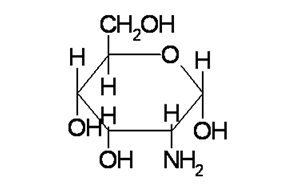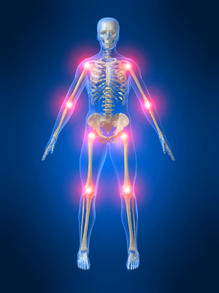|
There are many supplements out there on the market and recently joint health supplements became the fourth most popular supplement on the market, with multivitamins being the first. However it all comes down to whether or not they actually work. So let’s take a look at the most popular joint health supplement out there, Glucosamine.  Glucosamine is hands down the most popular joint health supplement and fourth most popular supplement in the world according to sales. Glucosamine is an aminosugar naturally found in the human body and in shellfish (Dahmer S, Schiller RM, 2008). It is present in most body tissues but most prevalent in joints and cartilage (Dahmer S, Schiller RM, 2008). It was initially believed that Glucosamine acted like a substrate or building block to collagen, however research is casting a lot of doubt on this theory (Henrotin Y, et al. 2012). There are many different forms of glucosamine supplements, the most common being; glucosamine sulfate, glucosamine hydrochloride and N-acetylglucosamine (Patel, K., 2015). Glucosamine keeps the cartilage in joints healthy and the natural levels of Glucosamine in the body begin to drop as people age, which can lead to the deterioration of the joints in use (Patel, K., 2015). Glucosamine is marketed to support the function and structure of joints, initially targeted towards people suffering from osteoarthritis, but is now common for many athletes (Patel, K., 2015), which is surprising when you look at the research. There are many studies showing benefits of Glucosamine supplementation for people suffering from osteoarthritis, however these findings have not been replicated in the athletic population (Patel, K., 2015). One study looking at Glucosamine supplementation at 1,500-3,00mg per day in bicycle racers showed that the supplement was able to reduce a biomarker for collagen degradation without significantly changing the biomarkers for collagen synthesis or the biomarkers for bone formation and resorption (Momomura R,I et al., 2013). Similar results were found in soccer players using similar research methods (Yoshimura M, et al, 2009). In another study looking at 106 male athletes with acute knee injury using 1,500 mg of Glucosamine compared to a placebo showed no reduction in pain or the size of the injured knee, however there was enhanced knee mobility in the treatment group compared to the placebo group (Ostojic SM, et al, 2007). So why has Glucosamine received the attention that it has as a means to reduce joint pain in the athletic population? Well one of the reasons why this may be the case is that athletes and people suffering from joint pain without a diagnosis of Osteoarthritis is because they typically take Glucosamine with NSAIDs (Non-Steroidal Anti-Inflammatory Drugs) (Gorsline RT, Kaeding CC, 2005). Common NSAIDs include over the counter painkillers such as Aspirin and Ibuprofen. NSAIDs work on a chemical level by blocking the Cox-1 and Cox-2 enzymes, which play a key role in making Prostaglandins. Prostaglandins are released by damaged tissues, which cause swelling, and they amplify the pain signals coming from nerves. (Feature, R., 2015) So if you’re suffering from osteoarthritis then glucosamine could help with that joint pain. But if you’re looking to reduce joint pain from physical activity, it’s unlikely that this supplement would do anything for you. But if you’re already taking an NSAID over-the-counter painkiller then you’re likely taking care of the issue already and Glucosamine isn’t likely to help.  Ben Sit, RD, Sports Dietitian, PTS Owner, Founder and President of Evolved Sport and Nutrition Complete Lifestyle Management References Dahmer S, Schiller RM Glucosamine . Am Fam Physician. (2008) Feature, R. (n.d.). NSAIDs for pain relief - WebMD. Retrieved September 13, 2015. Gorsline RT, Kaeding CC The use of NSAIDs and nutritional supplements in athletes with osteoarthritis: prevalence, benefits, and consequences . Clin Sports Med. (2005) Henrotin Y, Mobasheri A, Marty M Is there any scientific evidence for the use of glucosamine in the management of human osteoarthritis . Arthritis Res Ther. (2012) Momomura R, et al Evaluation of the effect of glucosamine administration on biomarkers of cartilage and bone metabolism in bicycle racers . Mol Med Report. (2013) Ostojic SM, et al Glucosamine administration in athletes: effects on recovery of acute knee injury . Res Sports Med. (2007) Patel, K. (n.d.). Glucosamine - Scientific Review on Usage, Dosage, Side Effects. Retrieved September 13, 2015. Yoshimura M, et al Evaluation of the effect of glucosamine administration on biomarkers for cartilage and bone metabolism in soccer players . Int J Mol Med. (2009)
3 Comments
21/2/2021 06:31:10 am
I found this on internet and it is really very nice.
Reply
Leave a Reply. |
Categories
All
Archives
November 2021
|
- Home/ News
- About
- Services/ Store
- Media
-
Learning Center
- ESN Athletic and Healthy Lifestyle Learning Center >
-
Professional Learning Center
>
-
The ESN Sports Nutrition Certificate
>
- ESN Learning Center - Sports Nutrition Certificate Level 1 >
- ESN Learning Center Sports Nutrition Certificate Level 2 >
-
ESN Learning Center - Sports Nutrition Certificate Level 3
>
- Module 1 - Periodization for the Athlete
- Module 2 - Nutrition Strategies to Optimize Recovery
- Module 3 - Sports Nutrition for Children and Young Athletes
- Module 4 - Sports Nutrition for the Aging Athlete
- Module 5 - Nutritional Strategies for Injury Prevention and Concussions
- Module 6 - Nutritional Strategies for the Travelling Athlete
- Module 7 - Tournament Nutrition Strategies
-
The ESN Sports Nutrition Certificate
>
- Contact
Proudly powered by Weebly


 RSS Feed
RSS Feed